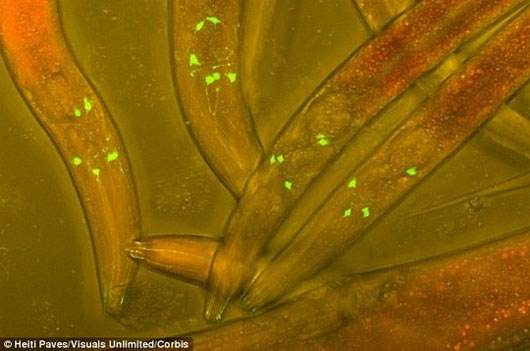Can accurately predict human life expectancy
Scientists at the China National Institute of Biology have found a way to accurately predict the lifespan of worms - research is considered a breakthrough leading to the ability to predict human life.
According to the work published in Nature, the team investigated the mystery of the organism's flow by observing the combustion of mitochondrial activity to energize cells.

Scientists have discovered a way to accurately predict the lifespan of worms
Observe the mitochondrial burning of nematode nematode , GS Meng-Qiu Dong and colleagues discovered glowing proteins when mitochondria are destroyed. The team thinks that the amount of light emitted in the mitochondria is caused by the presence or absence of free radicals.
Scientists believe that free radicals pile up, resulting from cell metabolism, reflecting the aging process of the organism. Experiments in nematode worms showed that the mitochondrial burning activity was lower, the worms lived longer, whereas the mitochondria burned higher, the worms died sooner - died 21 days before.

The team stated the ability to predict human life based on observations of mitochondrial combustion.
The team stated the ability to predict human lifespan based on observations of mitochondrial combustion as they experimented with worms. They argue that it is possible to observe the ability to live long in humans when they enter adulthood.
The theory of free radicals related to aging was initiated in 1972 but is still controversial. This theory suggests that the aging process is caused by cells accumulating free radicals that are damaged over time. Professor Dong stated: 'The mitochondrial fire spot makes an amazing forecast of the life of the organism. The mitochondrial theory of aging is true '.
- Is the life expectancy of human beings reaching the limit?
- Scientists predict human life can reach ... 5000 years
- Detecting biological clock predicting human life expectancy
- The secret of the relationship between names and life expectancy
- Predict your life expectancy through a simple test
- Tests help predict life expectancy from birth
- When will the human life reach the three-digit mark?
- Human life meter
- Can people extend life expectancy in the future?
- The average life expectancy of Japanese people reaches a new record: More than 87 for women and 81 for men
- Genetic life expectancy technology
- People live long is happiness or suffering?
 Green tea cleans teeth better than mouthwash?
Green tea cleans teeth better than mouthwash? Death kiss: This is why you should not let anyone kiss your baby's lips
Death kiss: This is why you should not let anyone kiss your baby's lips What is salmonellosis?
What is salmonellosis? Caution should be exercised when using aloe vera through eating and drinking
Caution should be exercised when using aloe vera through eating and drinking The great role of artificial gene combination technology
The great role of artificial gene combination technology  Find out how to replace weak old cells in the human body
Find out how to replace weak old cells in the human body  What is the life expectancy of a parent deciding the life of a child?
What is the life expectancy of a parent deciding the life of a child?  Create babies from 3 people, why not?
Create babies from 3 people, why not? 